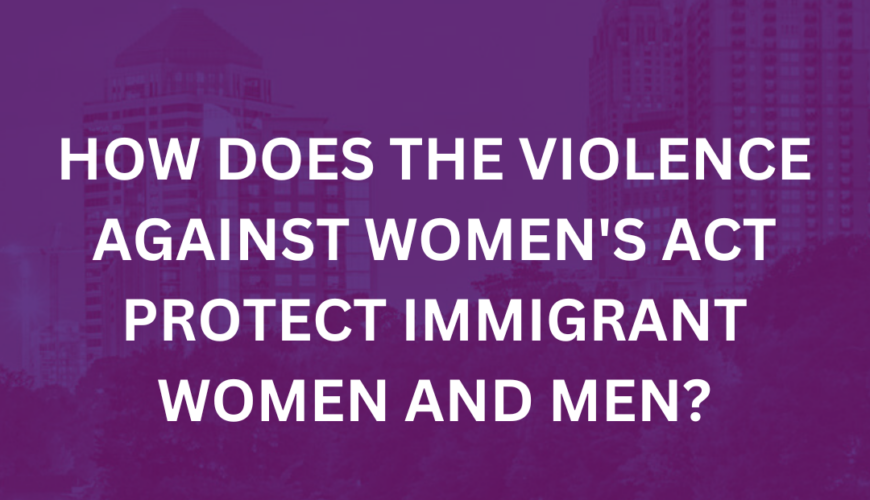Ensuring the safety and well-being of immigrant women and men is a crucial aspect of upholding human rights in our society. The Violence Against Women’s Act (VAWA) plays a pivotal role in providing protection and support for immigrant women and men who have experienced domestic violence, sexual assault, or other forms of abuse. Through VAWA, immigrant women and men are able to seek legal remedies and access resources that can help them break free from abusive situations and build a new life free from violence. Let’s delve into the ways in which VAWA specifically safeguards the rights and interests of immigrant women in our communities.
Provisional Protection under VAWA
Before delving into the specifics of how the Violence Against Women’s Act (VAWA) protects immigrant women and men, it is crucial to understand the provisional protections offered under this essential legislation. VAWA provides avenues for immigrant victims of domestic violence, sexual assault, trafficking, and other crimes to seek safety and legal status in the United States.
Self-Petitioning Process for Immigrant Victims
VAWA enables immigrant victims of abuse who are married to U.S. citizens or lawful permanent residents to self-petition for legal status without the abuser’s knowledge or involvement. This process empowers survivors to take control of their immigration status and protect themselves and their children from further harm. By self-petitioning under VAWA, immigrant survivors can break free from the cycle of abuse and establish a pathway to safety and independence.
Legal and Social Challenges
Obviously, immigrant women and men face unique challenges when seeking protection under the Violence Against Women’s Act (VAWA). These challenges often stem from legal and social barriers that can prevent them from accessing the support and resources they need to escape violence and abuse.
Barriers to Accessing Protection
Social stigma and fear of deportation can deter immigrant women and men from seeking assistance. Cultural norms and lack of awareness about their rights under VAWA can also hinder their ability to access protection. Additionally, language barriers may prevent them from understanding the legal process and obtaining necessary information.
Impact of Cultural and Language Differences
Social and cultural differences can further complicate the situation for immigrant women and men. These differences may create misunderstandings or miscommunication between the survivor and service providers, leading to inadequate support or inappropriate interventions. Language barriers can exacerbate this issue, making it difficult for immigrant women to express their needs and seek help effectively.
The impact of cultural and language differences on immigrant women seeking protection under VAWA cannot be underestimated. These disparities can result in a lack of understanding, miscommunication, and inadequate support, ultimately hindering immigrant women’s ability to access the assistance they desperately need. It is crucial for service providers and advocates to address these challenges sensitively and proactively to ensure that immigrant women are able to navigate the legal system and access the protections afforded to them under VAWA.
Support Services and Resources
Access to Shelter and Legal Advocacy
Legal assistance and access to safe shelter are vital components of the Violence Against Women’s Act (VAWA) for immigrant women facing domestic violence. Immigrant women who are survivors of domestic violence often face barriers to seeking help, including fear of deportation, language barriers, and lack of knowledge about their rights. VAWA provides funding for shelters and legal advocacy services specifically tailored to meet the needs of immigrant women.
Through VAWA, immigrant women and men can access shelters that are culturally sensitive and provide a safe haven from their abusers. Legal advocates are available to guide them through the process of obtaining protective orders, immigration relief, and other legal remedies. These resources empower immigrant women to make informed decisions about their safety and well-being.
Empowerment Through Education and Outreach Programs
Support services under VAWA also include education and outreach programs aimed at empowering immigrant women and men with the knowledge and skills to break free from abusive situations. These programs provide information on healthy relationships, financial literacy, and their legal rights as survivors of domestic violence.
For instance, education workshops may cover topics such as recognizing signs of abuse, developing safety plans, and accessing community resources for support. Outreach efforts ensure that immigrant women are aware of their options and can seek help without fear of judgment or reprisal. By equipping immigrant women and men with information and resources, VAWA empowers them to take control of their lives and move towards a future free from violence.
Conclusion
With this in mind, the Violence Against Women’s Act (VAWA) plays a crucial role in protecting immigrant women and men who are victims of domestic violence, sexual assault, and other forms of abuse. By providing avenues for immigrant women to seek protection and legal status independently of their abusers, VAWA empowers these individuals to break free from abusive situations and access the support they need to rebuild their lives. Additionally, VAWA recognizes the unique challenges faced by immigrant women and men and ensures that they are not further marginalized or vulnerable due to their immigration status. As a result, VAWA stands as a vital resource in the fight against gender-based violence and serves as a beacon of hope for immigrant women seeking safety and justice in the United States.

